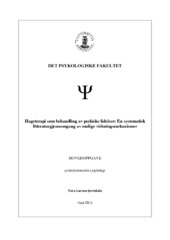| dc.contributor.author | Jervidalo, Tora Larsen | |
| dc.date.accessioned | 2016-09-15T12:50:25Z | |
| dc.date.available | 2016-09-15T12:50:25Z | |
| dc.date.issued | 2015-11-24 | |
| dc.identifier.uri | https://hdl.handle.net/1956/12804 | |
| dc.description.abstract | Horticultural therapy is a treatment intervention that use garden environment and gardening to achieve therapeutic changes. This systematic mixed methods review is an attempt to achieve a greater understanding of why horticultural therapy works, by a) examine what the available research on horticultural therapy as treatment of mental illness suggest in terms of possible mechanisms of change associated with the relationship between nature and human, and b) evaluate the empirical findings in the light of three selected explanatory theories; attention restoration theory, aesthetic affective theory and supportive environmental theory. The systematic search resulted in 24 included studies, of which eight were qualitative studies, ten were quantitative studies and six were mixed method studies. The quantitative and qualitative data were processed and analyzed separately, and evaluated in the light of the explanatory theories. The results of the examined studies indicate that horticultural therapy indeed relieves the participants of symptoms. It has nevertheless been challenging to provide an clear answer to why garden therapy seems to work. Overall impression from the review is that attention capacity, affective responses and supportive environment all appear to possibly be involved mechanisms, and might act as complementary explanations of the effect of horticultural therapy. Limitations were discussed, as well as implications for clinical practice and suggestions for future research. | en_US |
| dc.description.abstract | Hageterapi er en behandlingsintervensjon som bruker hage og hagearbeid for å oppnå terapeutiske endringer. Denne systematiske litteraturgjennomgangen er et forsøk på å oppnå en bedre forståelse av hvorfor hageterapi virker, gjennom å a) systematisk undersøke hva den tilgjengelige forskningen på hageterapeutisk behandling av psykiske lidelser viser når det gjelder mulige spesifikke virkningsmekanismer i relasjonen mellom natur og menneske, og b) evaluere de empiriske funnene i lys av tre utvalgte forklaringsteorier; attention restoration theory, aesthetic affective theory og supportive environmental theory. Det systematiske litteratursøket resulterte i 24 inkluderte studier, og av disse var åtte kvalitative studier, ti var kvantitative studier og seks studier brukte en kombinert metode. De kvantitative og de kvalitative dataene ble behandlet og analysert separat, og evaluert i lys av forklaringsteoriene. Resultatene i litteraturgjennomgangen indikerer at hageterapi gir symptomreduksjon hos deltagerne. Det har imidlertid vist seg utfordrende å gi et konkret svar på hvorfor hageterapi virker. Hovedinntrykket fra gjennomgangens resultater er at oppmerksomhetskapasitet, affektiv respons og støttende miljø virker alle å være involverte virkningsmekanismer, og kan fungere som komplimenterende forklaringer på hageterapiens virkning. Begrensninger ble drøftet, samt kliniske implikasjoner av resultatene og forslag til fremtidig forskning. | en_US |
| dc.format.extent | 1651139 bytes | en_US |
| dc.language.iso | nob | eng |
| dc.publisher | The University of Bergen | eng |
| dc.subject | horticultural therapy | eng |
| dc.subject | nature-assisted therapy | eng |
| dc.subject | mental health | eng |
| dc.subject | mental illness | eng |
| dc.subject | attention restoration theory | eng |
| dc.subject | aesthetic affective theory | eng |
| dc.title | Hageterapi som behandling av psykiske lidelser: En systematisk litteraturgjennomgang av mulige virkningsmekanismer | eng |
| dc.type | Master thesis | |
| dc.date.updated | 2016-09-15T12:37:37Z | |
| dc.rights.holder | Copyright the author. All rights reserved | eng |
| dc.description.localcode | PSYK300 | |
| dc.description.localcode | PRPSYK | |
| dc.subject.nus | 736102 | |
| fs.subjectcode | PSYK300 | |
